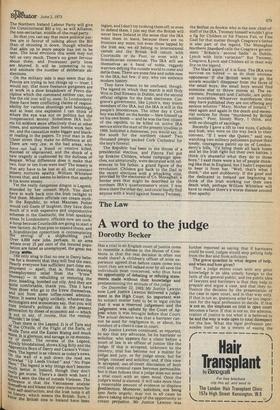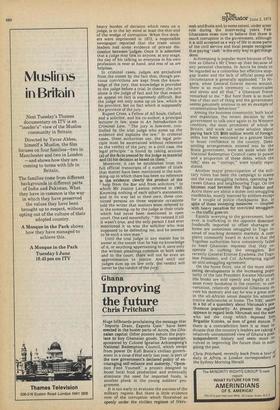A word to the judge
Dorothy Becker
Has a trial in an English court of justice come to resemble a debate in the House of Commons in that the real decision is often not made there? A children's officer of wide experience agreed that before cases come into court they are well talked over by all save the individuals most concerned, who thus have no opportunity of debating or refuting statements made without their knowledge and predetermining the attitude of the judge.
On December 22, 1965, Mr Justice Lawton now Lord Justice Lawton delivered a judgement in the High Court. So important was its subject matter held to be in legal circles that it was a reserved judgement. and the judgement was upheld by the Court of Appeal when it was brought bcfore that Court. The actual decision was that a barrister cannot be sued for negligence in, or about, his conduct of a client's case in court.
Mr Justice Lawton continued, as reported, to say that any advocate, be he barrister or solicitor, who appears for a client before a court of law is an officer of justice like the judge. If this is accepted, unknown to the country, trial has become not a matter for judge and jury, or for judge alone, but for judge, counsel and solicitor, and, if this view is accepted, out-of-court discussion of both civil and criminal cases becomes permissible, but it then follows that a judge does not enter a trial court with an open mind. Once the judge's mind is slanted, it will take more than a reasonable amount of evidence to displace 15redilection. Moreover, solicitors, not being ipso facto angelic, may not in all cases be above taking advantage of the opportunity to create prejudice. Mr Justice Lawton was further reported as saying that if barristers could be sued, judges would stop getting help from the Bar and from solicitors.
The grave question is: what degree of help, and when and how given?
That a judge enters court with any prior knowledge is an idea utterly foreign to the faith of the general public, and the public idea of lawyers and barristers is that they help to prepare and argue a case, and that they influence the decision by the presentation of the case in open court, and in that way only. If that is not so, questions arise far too important for the legal profession to decide. If that is not so, the emphasis on trial in open court becomes a farce. If that is not so, the administration of justice is not what it is believed to be and the way is wide open to total disrespect for the law. What the legal profession persuades itself to be a means of easing the heavy burden of decision which rests on a judge, is to the lay mind at least the thin end of the wedge of corruption. When five dockers were imprisoned in 1972, a responsible newspaper reported that the trade union leaders had some evidence of private discussion between judges. Once it is admitted at a judge may talk to anyone, at any stage, the day of his talking to everyone in his own profession is near at hand, and rest of us are helpless.
In criminal cases, judges are prejudiced from the outset by the fact that, though previous convictions are kept from the knowledge of the jury, that knowledge is provided to the judge before a trial. In theory, the jury alone is the judge of fact and for that reason an appeal on fact is supremely difficult. But the judge not only sums up on law, which is his province, but on fact which is supposedly the province of the jury.
Rupert Cross, a Fellow of All Souls, Oxford, and a solicitor, and his co-author, a principal lecturer in law, state in An Introduction to Criminal Law, "The jury is however, controlled by the trial judge who sums up the evidence and explains the law." In criminal cases, these authorities say, the legal principle must be ascertained without reference to the verdict of the jury; in a civil case, the legal principle "is found by taking account (a) of the facts treated by the judge as material and (b) his decision as based on them."
Moreover, it can be established trom the full official transcripts of a number of trials that matter have been mentioned in the summing-up to which there has been no reference in the evidence: clearly the product of the "help from the Bar and from solicitors" to which Mr Justice Lawton referred in 1965. Knowing nothing of each other's statements, and in no way led to their own, three convicted persons on three separate occasions told the writer that matters were referred to in the summing-up by the judge at their trials which had never been mentioned in open court. One said mournfully, " He twisted it till it wasn't true, and the only person I had ever mentioned it to was the solicitor who was supposed to be defending me, and he seemed to be such a nice man."
Until the trial judge in any matter has to swear at the outset that he has no knowledge of it, or anything appertaining to it, save only the written pleadings common to both sides and to the court, there will not be even an approximation to justice. And until our judges sum up on law only, the verdict will never be the verdict of the jury,



































 Previous page
Previous page